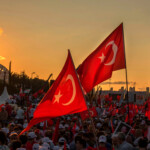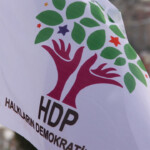Recep Tayyip Erdoğan won the presidential elections in Turkey last Sunday, defeating Kemal Kiliçdaroglu in the second round. Despite soaring inflation and unfavorable opinion polls, the ‘Reis’ managed to beat all the odds to secure a third five-year term at the helm of the country of the Bosphorus. Samim Akgönül, Director of the Turkish Studies Department at Strasbourg University, analyses the election for Blue News.
Was Kemal Kiliçdaroglu the favourite before the presidential election, and did he make any mistakes during his campaign?
“First of all, it is important to bear in mind that the polling sector in Turkey is very polluted and very diverse. Some showed him in the lead while others did not… You could say that each poll built its own sample with methods that were sometimes rather opaque. We must therefore be wary of these opinion polls.
“However, Kemal Kiliçdaroglu did make mistakes during the election campaign. Most commentators agree that his first mistake was his candidacy. He is 74 years old and has already lost many elections. What’s more, the leader of the Nation Alliance is part of the Alevi religious minority, which prevents him from gaining the support of conservative Sunnis. Despite all this, he won 48% of the vote in a country as conservative as Turkey, which is already a great achievement.”
“His second mistake coincided with the hardening of his rhetoric between the two rounds, particularly towards Syrian immigrants, in order to attract votes from the xenophobic far right. This change of tone certainly displeased the pro-Kurdish left flank of his coalition, which led to a greater abstention rate on that side of the Alliance. In the end, it can be said that all this is the consequence of communicating vessels. When you build such a broad coalition, you inevitably displease one side if you try to please another.
Who are the people who have given their support to Recep Tayyip Erdoğan?
“There are two very important sides to Recep Tayyip Erdoğan’s re-election. Firstly, his prophetisation, even deification, in the eyes of an electorate that sees him as the guarantor of three majorities in Turkey: Sunnis against Alevis, Turks against Kurds and Conservatives/religious against secularists.”
“Secondly, Erdogan has managed to make people believe that he embodies the State. What’s more, during his campaign he focused on dividing people rather than bringing them together. He drew a distinction between those who defend and those who fight against the state. In short, we can say that the outgoing President’s supporters are part of these three majorities (Sunnis, Turks and Conservatives) and are also individuals who deify the State and therefore the person of Erdogan”.
With this success for Recep Tayyip Erdoğan, could we see a popular revolt erupt in Turkey?
“In 2013, there was a protest movement that had formed. It scared the regime so much that Erdoğan has since blocked any possibility of street organisation through civil society. Today, ten years on from those events, it is virtually impossible for a popular revolt to break out in Turkey. The only ones capable of doing so would be the Kurds, but they are politically decimated, since most of their leaders have been sent to prison by Erdogan.
What will be the international consequences of Erdoğan’s victory?
“The international consequences of this election are both continuity and hardening. Continuity in the quest for multilateralism. This means that Erdoğan will want to depend less and less on the West in order to rely more on his alliance with Russia. In this respect, it should be noted that Putin did a great deal to ensure Erdogan’s re-election. Thanks to the war in Ukraine and the Syrian conflict, he will also be seeking to act as an intermediary between Europe and Moscow”.
“Finally, Erdoğan also aims to rally Arab populations behind his power. In this way, he is appealing not only to the countries of the Middle East and the Gulf States, but also to the streets of the suburbs of European cities, where the descendants of former Muslim immigrants see him as the one who opposes the government of the countries where they live. Erdogan is therefore going to continue along this path, while hardening it over time.”
Finally, how will Erdoğan raise his country, which is currently going through a serious economic crisis?
“You have to realise that Erdoğan is the main person responsible for this crisis, insofar as he has made the wrong economic choices, particularly when it comes to interest rates. Interest rates were artificially maintained during the election campaign thanks to money from Russia and the Gulf States in order to promote his re-election. Now that the election is over, there will certainly be turbulence in the Turkish economy.”
However, this country is too important economically and geostrategically to let it go bankrupt. I therefore believe that there will be an infusion from Russia, the Gulf States and possibly even the European Union, since Turkey is also a transit country that is beginning to control the energy routes between the Caucasus and Europe. In view of all these factors, I don’t think it will be long before Turkey receives an economic infusion.


